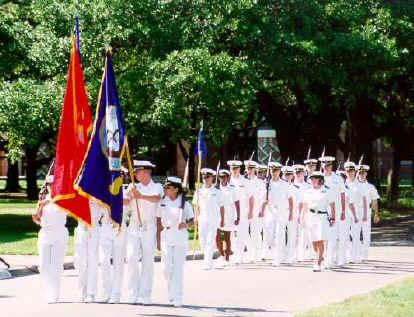The training of new officers in the US military
is expensive and wasteful. The high cost of operating the three service
academies is well known. However, ROTC is also wasteful and should be trimmed, especially
small programs which
have almost as many full-time support personnel as the number of officers they
commission each year, like the tiny NROTC unit at Rice University (below).
 Officers
in small units feel pressure to lower standards to improve the size of their
cadet companies, which is demoralizing to all. Efforts to eliminate
small ROTC programs are often killed by Congressmen.
Officers
in small units feel pressure to lower standards to improve the size of their
cadet companies, which is demoralizing to all. Efforts to eliminate
small ROTC programs are often killed by Congressmen.
For unknown reasons, Army ROTC programs require twice the staff as Navy and Air Force programs of similar size. For example, Army ROTC at Purdue with around 80 cadets is led by a huge staff consisting of one lieutenant colonel, three majors, five captains, two lieutenants, four sergeants and several civilian personnel. And keep in mind that these cadets are not full-time soldiers who must be supervised all day, they just take a military class a couple times a week. They should be led by one major, one captain, and one sergeant.
If the Department of Defense took a close look at ROTC staffing, it could free a thousand uniformed personnel for combat units. A thousand more could be freed by developing a Unified ROTC command so that duplicate programs at each university can merge. If Navy ROTC can produce Marine Corps officers, why not Air Force and Army officers? There are 270 Army ROTC programs, 144 Air Force ROTC programs, and 57 Navy/Marine NROTC programs. These could be merged into some 300 Unified ROTC programs to allow the elimination of the three duplicative ROTC commands. This will increase recruiting and ROTC opportunities for the Navy and Marines who have just 57 programs today, and will double the Air Force presence in the nation's colleges. Unified ROTC will also allow some new ROTC units at smaller schools while reducing the awkward requirement for many units to run programs on smaller campuses as a regional consortium.
Separate ROTC administration on each campus can merge as units become multi-service, and the overall number of ROTC facilities are cut in half. This will provide a "joint" experience for cadets and the military staff who must work with members of all services. Cadets can wear khaki and attend identical classes during their first two years, such as: leadership, ethics, physical fitness, and drill. Joint classes should be taught, such as: military history, military aviation, rank and insignia, and small arms. This will produce superior US military officers since they've had instructors and classmates from all four services who provided an overview of the US military without the narrow viewpoint of a single service. A larger pool of cadets will allow ROTC units to field teams for intramural sports while providing a more visible presence on campus.
Towards the end of their sophomore year, non-scholarship cadets will need to choose a service depending upon what future commissioning slots are available. They will go off for summer training run by each service, and when they return they will still wear khaki and participate in ROTC activities. However, they will attend service specific classes taught by officers from their future service. There is no doubt this will work, it has worked for the Navy and Marine Corps for decades, as well as traditional military colleges like the Virginia Military Institute. Army ROTC produced "Air Corps" officers before the Air Force was created in 1947. Unified ROTC can also free some two thousand uniformed servicemen for duty in combat units and a thousand civilian support personnel for work elsewhere in the US military.
Carlton Meyer editorG2mil@Gmail.com
©2003 www.G2mil.com
Letters
Eliminate ROTC
I just read your ROTC editorial and you are right on. ROTC is extremely wasteful. As a recent ROTC commissioned (Army), I am appalled at the level of waste that takes place in these units. The cadre at my battalion basically had high-paying "do nothing" jobs. I was a "Gold Bar Recruiter" during the summer, where I was paid in excess of three thousand dollars a month to essentially do nothing.
Now that I am in OBC with a number of OCS-commissioned LTs, I wonder why the services even have ROTC or the academies any more. Every one of the OCS grads that I met so far is very mature and highly competent in comparison to the ROTC or USMA grads. The average OCS grad is a few years older (25-30 for OCS as opposed to 22-24 for ROTC/USMA) and most have extensive prior military service (as opposed to very little prior service for ROTC/USMA grads).
I think that the military should just get rid of ROTC (and dare I say - the academies too) and just go straight OCS. They can expand the OCS program and a ton of money will be saved when ROTC and the academies are disbanded. The services should hash out if candidates should have prior enlisted service. Please do not disclose my name
2LT
Ed: A young officer offers a way to save the US Army millions of dollars, yet is fearful of having his name published. Has the US Army become the Soviet Army?